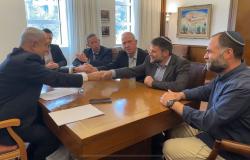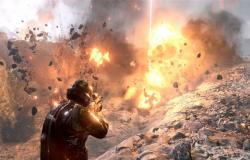The Secretary of State, on the sidelines of the presentation of a book by Don Giussani at the Pontifical Gregorian University, recalls that it is the responsibility of the Italian bishops to express themselves about the situation in the country. Regarding the presence of the Pope at the G7 in Apulia, on June 14, the cardinal believes that he will speak about “the application of artificial intelligence in weapons” and that he could have a bilateral meeting with the president of the United States, Joe Biden.
Vatican News
“One of the points on which the Church insists is that of participation, which is an exercise of democracy. Therefore, the invitation to all citizens is to act responsibly, participating in the votes.” This is how the Cardinal Secretary of State, Pietro Parolin, responded, on the sidelines of the presentation of the book “The Christian Sense of Man according to Reinhold Niebuhr”, a doctoral thesis by Don Luigi Giussani at the Pontifical Gregorian University, to the journalists who questioned him about the imminent parliamentary elections of the European Union.
Likewise, Parolín spoke about the concerns of the Italian bishops about the constitutional reform proposals on the “premiarate” that would give greater power to the head of government through a direct election and that of “differentiated autonomy” that would give more decision-making power to the regions. Asked about the position of the Holy See regarding these “concerns”, the Vatican Secretary of State emphasized: “The Italian Episcopal Conference is the Church in Italy and, like all the Churches in the world, the Italian bishops are free to express themselves. They will do it their way, but it is their responsibility.
The Pope’s participation in the G7 in Apulia
Regarding the possibility that Pope Francis, at the G7 on June 14 in Puglia, will have a face-to-face meeting with the president of the United States, Joe Biden, the cardinal responded: ”I think so, the Pope will dedicate time to some bilateral meetings with presidents and heads of state who have requested it. So I imagine there will be this too.”
Regarding the content of the Pope’s speech at the summit on the topic of artificial intelligence, Parolin thinks that “he will make a mention of the application of artificial intelligence on weapons.”
We remember that on January 1, 2024, Italy assumed the presidency of the G7 for the seventh time, which brings together, in addition to Italy, Canada, France, Germany, Japan, the United Kingdom and the United States, although the European Union also participates in the conference. The summit, which will be attended by Pope Francis at the invitation of the Italian Prime Minister, Giorgia Meloni, will take place in the Italian region of Apulia, from June 13 to 15. The Pontiff will speak, on June 14, in the session dedicated to Artificial Intelligence open to non-member countries, and it will be the first time that a Pope attends a G7 Summit.
“Giussani always returns to the event of the Incarnation.”
In his speech on Don Giussani’s doctoral thesis, Cardinal Parolin stressed that “the conclusion that Giussani reaches at the end of his long tour of Niebuhr’s work is clear: “Both from a philosophical and theological point of view, the Niebuhr’s work is deeply unsatisfactory for our spirit of Latin and Catholic tradition.” Giussani severely questions Niebuhr’s understanding of the “constitutive truth of Christian Revelation in its essential elements.” On the basis of liberal theology – from which in other respects he distances himself – and the distinction between the historical Jesus and the Jesus of faith, the American theologian in fact rejects the traditional concept of the Incarnation.’
And referring to Giussani’s thought, the cardinal concludes that “the event of the Incarnation is the core of Christianity to which Giussani always returns, tirelessly. He not only says that Christianity ‘was’ an event, but that ‘is’ an event, that is, that this unique event remains in history as an event, as ‘something that is happening now'”, and this happens in the Church which – the Secretary of State emphasizes – “is proposed to all men as the form of the event of Christ now, which responds to the thirst for meaning and plenitude, for hope and peace, of those who live now, immersed in the drama and suffering that, along with the normal events of existence, bloody conflicts and lacerating wounds of the present time worsen even more inexorably.
The presentation at the Gregorian
At the presentation of the volume, which rephrases the doctoral thesis that Don Luigi Giussani, founder of Communion and Liberation, defended on June 23, 1954 at the Venegono Seminary, Michelina Tenace, professor emeritus of Dogmatic Theology at the Gregorian, and Monica Scholz-Zappa, editor of the volume. Father Andrea D’Auria, director of the International Center for Communion and Liberation in Rome, moderated the meeting. The work will also be presented in Milan on Tuesday, June 11, at 6:00 p.m., in the Pius XI Hall of the Catholic University of the Sacred Heart, by the Archbishop of Milan, Mario Delpini, together with Father Enrico Castagna, Rector of the Seminary of Venegono, and Lorenzo Ornaghi, former Rector of the Catholic University. Commissioner Scholz-Zappa will also be present. The event will be moderated by journalist Alessandro Zaccuri.






